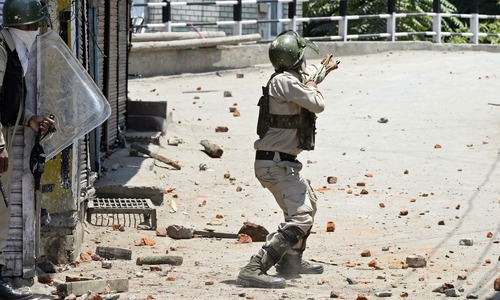“YOU must be sad today, your brothers were martyred,” said an Indian army soldier, directing a bright torchlight at our faces. The 50-km Shopian-Srinagar highway was largely deserted, with groups of men huddled around a cell phone at some places. Ambulances were also passing through the road.
A few hours ago, three gunfights had taken place in the southern region of occupied Kashmir at daybreak. The militants exchanged gunfire with Indian troops for hours, leading to the killing of 13 militants, three soldiers and four civilians.
Take a look: Valley of death: Being young and restless in Kashmir
In sporadic clashes throughout the day, at least 150 people were injured, including over 30 hit by pellets. The government immediately imposed restrictions and suspended internet services while pro-freedom leaders called for a shutdown.
Before being stopped by army personnel on the highway, we attended two funerals and visited the scene of a gunfight — now reduced to a debris of several houses.
The first spot was Pinjoora village, where hundreds of people had gathered on a road, waiting for the body of a militant, Ishfaq Ahmad Malik.
One of them said: “They have killed so many mujahids, they all are from neighbouring villages. They have destroyed Shopian.”
Malik was brought in a car, with people struggling to see his face. Another group was surrounding another small car carrying the body of Zubair Ahmad Turray, a popular militant. Both were killed, along with five others, in Druggad village.
We followed the mourners into a small compound of Malik’s one-storey house. Relatives and friends were showering his body with candies in the same manner as people welcome a groom.
People were jostling in the compound, standing on their toes, and climbing the walls to have a last glimpse of his face, but could see only his red sports shoes and blood-stained, camouflaged trousers.
His body was then kept on a makeshift podium in a nearby ground at the foot of a hill overlooking Shopian. When the funeral prayers began, a few people fell unconscious and many continued wailing.
A young man sitting next to me said: “He was a boy who joined the militants two months ago. A few weeks ago when a civilian was shot dead, Ishfaq came to offer a gun salute during the funeral.”
Malik was in New Delhi before he joined the militants. “His friends didn’t know about his plans, but when he bought an expensive torchlight, they felt he is planning something,” said the young man, offering a cigarette to his friend.
A pall of smoke engulfing the skies at a distance could be seen from the hill. It was coming out of burning houses in Kachdoora village, where a daylong gunfight had subsided after claiming the lives of five militants.
After Malik’s funeral, we left for Shopian town, where thousands of people had gathered at the Eidgah ground, near the district court complex. Young men had climbed trees and walls, women were wailing on one side, while the body was kept on a podium. Portraits of pro-freedom leaders and militants hung from a thread tied to trees.
After the prayers were over, people started leaving the ground while a group of men started pelting stones at the court complex. A few aged men tried to stop them, but they overpowered everyone to barge into the complex.
Paramilitary forces reacted with tear gas shelling and firing into the air. Since they did not spare even the funeral procession, chaos overtook the gathering. “May God perish snitches,” a few women shouted.
After the procession, we reached Kachdoora, where hundreds of people were sifting through the debris of burnt houses. Walking through the broken tin sheets, windowpanes, glasses and ashes, commotion broke out when a body was found in the debris. A burnt body was wrapped in a blanket and taken out amid pro-freedom slogans.
“We later heard there were seven militants in this house,” an old man, owner of a neighbouring house, said. “The army cordoned off the houses around 12.30am and then an exchange of fire started. We were evacuated and till an hour ago, the forces were here.”
Outside the compound, two women hugged each other. One of them said to the other: “Thank Allah that at least you are alive. Houses can be reconstructed.”
The wailing woman retorted: “No, we lost our boys.”
Fahad Shah is an independent journalist and editor of The Kashmir Walla magazine.
Published in Dawn, April 3rd, 2018














































